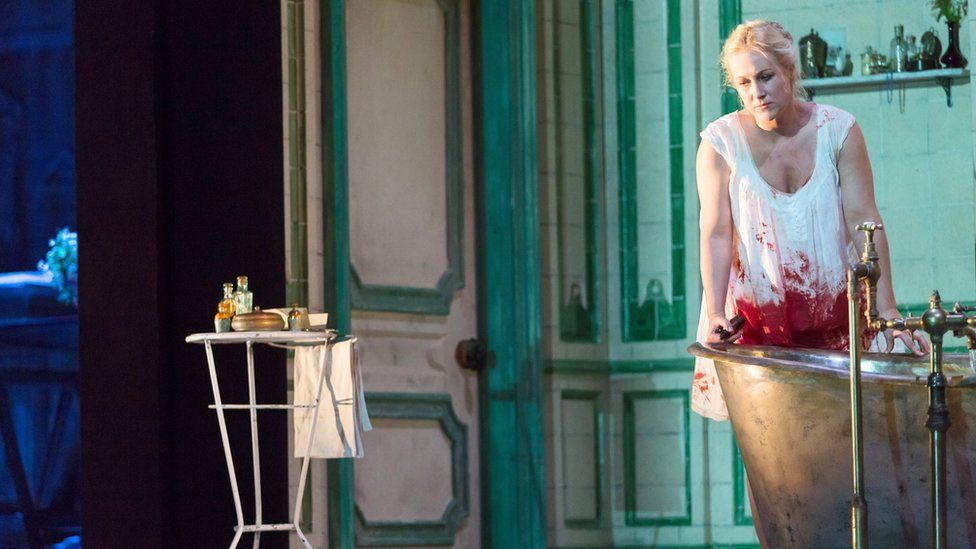Royal Opera House audience boo violent production of Lucia di Lammermoor
- Published

The opening night of a production of Lucia di Lammermoor has been booed by the audience at the Royal Opera House.
The production of Donizetti's tragic opera directed by Katie Mitchell had been preceded by warnings of explicit sex scenes and violence.
It featured extra scenes that included a miscarriage on stage.
The warnings came after the London venue was forced to apologise following a 2015 production of William Tell which contained a rape scene that upset many.
Charlotte Higgins, chief culture writer for the Guardian who was in the audience, called the reception "pretty extraordinary".
"It was booed as much as it was cheered, so there was a real feeling of division in the audience," she told the Today programme.
She said the warnings were unnecessary as "the opera is inescapably violent and unpleasant", even without the extra scenes which do not originally feature in the opera.
"These are dark and scary extraordinary pieces of work - they are are not there to comfort us, they are there to make us think about our own lives and take us to dark and unpleasant places," she said.
The extra scenes include a passionate sex sequence and, after the audience are led to understand Lucia was pregnant, a miscarriage on stage.
Another big change in the production is a scene where Lucia stabs the husband she has been forced to marry, which normally happens off stage.
Director Mitchell said she added the scenes to deepen the audience's understanding of Lucia.
"The male characters in Lucia di Lammermoor are on stage a lot, their psychologies are well drawn, they're complex and thrilling and interesting.
"My beef with the piece is that there just isn't that same degree of attention and thoughtfulness in the drawing of the female characters. There are scenes that seem to be missing. So my production will try to fill in some of the gaps in the central character's story. It will balance things out."
German soprano Diana Damrau, who plays the role of Lucia, has defended the production.
"This production is not for the sake of showing off blood," she told Radio 4's Front Row.
"It allows us to give more depth to the characters and to tell the story much deeper... you really get all the emotions of all the characters.
"I think for our time it's not so shocking any more - if you would have shown this 30 years ago this would have been a real shocker."
Damrau has played the role of Lucia seven times previously, but said the new production with extra scenes was a challenge as it required more acting skills.
"The most challenging thing is to act the miscarriage because that means to involve the whole body... and sometimes you get carried away so at the beginning of the rehearsals you start crying during the scene which you can never do singing a role like Lucia - because the mucus goes on to the vocal cords. It's not easy to have all your emotions in control," she said.
The production has divided critics - while Higgins called it "an incredibly powerful production" with "extraordinary performances from the cast", that left her "moved and completely compelled by it", The Telegraph's Rupert Christiansen gave the opera two stars calling it "too leaden even for the hecklers".
He said the extra scenes were "perverse - and heavy-handed", saying the audiences "noses are rubbed in the grisly details of Lucia's miscarriage".
The Stage's George Hall also gave the production three stars, saying "with its fussy over-direction, Katie Mitchell's staging disappoints dramatically as well as musically".
The production will be screened live in cinemas on 25 April.
In June last year the opening night of William Tell at the Royal Opera House was marked by boos over a rape scene with nudity.
The Opera House issued a statement after the performance apologising for any distress caused.
- Published2 July 2015
- Published30 June 2015
- Published17 July 2014